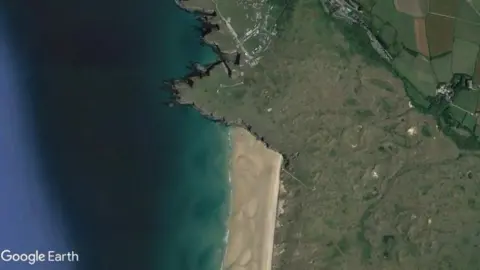Military exercise helping sand dune habitat restoration at Penhale
 BBC
BBCA military training exercise is helping to restore sand dune wildlife habitats at Penhale Dunes in Cornwall.
The British Army is removing patches of scrub from overgrown areas of sand dunes on MOD land using diggers, to boost the area's biodiversity.
The large dunes near Perranporth are home to a variety of wildlife, including lizards, adders, orchids and rare bees and butterflies.
They are at risk as areas of bare sand and low grassland have reduced.
This is caused by the loss of natural grazing, climate change and air pollution, Cornwall Wildlife Trust said.
 Google Earth
Google EarthFour 16-tonne military diggers are being used by the British Army's 165 Port and Maritime Regiment to expose areas of bare sand on Penhale's overgrown dunes, near Perranporth.
The work is taking place as part of Dynamic Dunescapes, a conservation project aiming to restore 7,000 hectares of sand dune in England and Wales.
Carolyn Cadman, Cornwall Wildlife Trust chief executive, said: "Sand dunes are one of the most at risk habitats in Europe, nowhere more so than in Cornwall.
"Pressures from development, tourism and climate change mean we need to manage them as effectively as possible."
The work is taking place away from sensitive areas of the dunes, during a time which is outside of many species' breeding season, to minimise disturbance from the machinery.

Follow BBC News South West on Twitter, Facebook and Instagram. Send your story ideas to [email protected].
